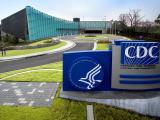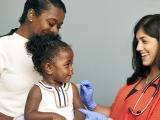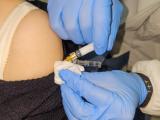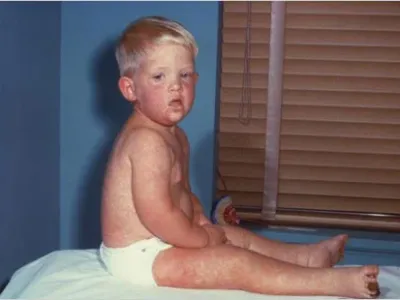A federal vaccine advisory group has established a panel to review the safety and efficacy of the childhood immunization schedule, according to a document posted yesterday on the Centers for Disease Control and Prevention (CDC) website.
The Childhood and Adolescent Immunization Schedule Workgroup (WG), established within the CDC's Advisory Committee on Immunization Practices (ACIP), will review data and "clinical and scientific knowledge" and present its findings to help ACIP members make policy recommendations.
"As part of ACIP's core mission to develop recommendations on the use of vaccines in the civilian population of the United States, the committee is standing up a WG focused on assessing the safety and effectiveness of the childhood and adolescent schedule," the document states.
Among the topics the group will review are the timing and order of different childhood vaccines, administering different vaccines at the same time, the safety of certain vaccine ingredients, and the different childhood vaccine schedules used in other countries.
New scrutiny on childhood vaccines
The establishment of the work group is the latest move by the ACIP, which now includes 12 members hand-picked by Health and Human Services (HHS) Secretary Robert F. Kennedy Jr., to take on the routine childhood immunization schedule.
Kennedy and other vaccine critics have long suggested—without evidence—that the number of vaccines US children receive, and when they receive them, may be tied to the development of health problems and neurodevelopmental conditions. They've also argued that the long-term effects of childhood vaccines haven't been thoroughly studied.
At the first meeting of the newly reconstituted committee in June, ACIP Chair Martin Kulldorff, PhD, said he would establish a new working group to look at the cumulative effect of vaccines on the CDC's recommended schedule for children and adolescents. Then, at its most recent meeting in September, ACIP members recommended that the combined measle, mumps, rubella, and varicella (MMRV) vaccine no longer be offered to children aged 12 to 47 months and instead be given as separate shots. The group also considered removing the recommendation for a birth dose of the hepatitis B vaccine but decided to table a vote on the issue.
In August, HHS announced it was reinstating the Task Force on Safer Childhood Vaccines, a long-dormant federal panel created by Congress in 1986.
The work group is one of several employed by the ACIP to review vaccine safety and efficacy data and to craft the wording and proposed recommendations for ACIP discussions and votes. ACIP work groups typically included outside experts and receive support from CDC staff members. But in a move that raised some red flags, in August, HHS, which oversees the CDC, barred members of nonvoting liaison groups, like the American Academy of Pediatrics, from participating in work groups.
The CDC document says the establishment of the childhood immunization work group is part of a multiyear effort to review and summarize published and unpublished research and safety surveillance systems and "determine whether a change in the vaccine schedule may be warranted, outline various options, and vote on which option to recommend to the full ACIP for consideration."
ACIP's vaccine recommendations are the basis for the CDC's childhood immunization schedule and for federal and private health insurance coverage of vaccines. Some public health experts have suggested Kennedy is using ACIP, which now includes several members who are vaccine critics, to make changes to the schedule.
"I think a lot of the policy steps he's taken are setting up an outcome where he's going to try to restrict access to pediatric vaccines," former Food and Drug Administration commissioner Scott Gottlieb, MD, told CNBC last month. "He's been very systematic, very methodical, and, frankly, very effective at putting in place the people and tools he needs to try to effectuate this goal."
Gottlieb added that he's concerned one of Kennedy's goals is to seek evidence against alum, which is used in many pediatric vaccines. The CDC document specifically mentions use of aluminum adjuvants as one of the topics the work group will investigate. Other issues the work group will examine include whether the risk of post-vaccination febrile seizures increases or decreases with concurrent administration of vaccines, and whether the last dose of non-live diphtheria, tetanus, and pertussis (DTaP) vaccine should be given before, on the same day, or after the measles, mumps, and rubella (MMR) vaccine.
MMR vaccine could be a target
The move also comes amid calls by President Donald Trump and acting CDC Director Jim O'Neill for the MMR vaccine to be replaced with separate vaccines for measles, mumps, and rubella.
"I call on vaccine manufacturers to develop safe monovalent vaccines to replace the combined MMR and 'break up the MMR shot into three totally separate shots,'" O'Neill said in a post on the social media site X earlier this week. President Trump made the same suggestion in a social media post in late September. Neither Trump nor O'Neill have provided any evidence for why they believe MMR vaccine needs to be replaced with monovalent vaccines.
As Jake Scott, MD, an infectious diseases physician at Stanford University, noted yesterday in an op-ed for CIDRAP News that the medical evidence strongly favors combination vaccines. Furthermore, creating new monovalent vaccines for measles, mumps, and rubella could take years.
"O'Neill's statement creates immediate risk," Scott wrote. "Parents hearing the CDC director question vaccine safety may delay or skip vaccination while waiting for alternatives that do not exist and will not exist for years."





















